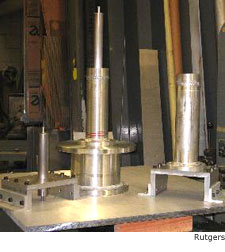(b) Your classmates: Many of you come into this with a great deal of knowledge and
talent. Make it your business to find out which of your classmates is already an expert
in something and tap into that expertise.
 (c) The Prof and TA: Each of us will spend time in the laboratory outside of class time,
randomizing our hours to try to cover all the times used by groups and teams. If you
need to meet with us, have a member of your group arrange a time for one of us to be
here when your group or team is. Personal problems of individual students can be
handled in my office, by arrangement.
(c) The Prof and TA: Each of us will spend time in the laboratory outside of class time,
randomizing our hours to try to cover all the times used by groups and teams. If you
need to meet with us, have a member of your group arrange a time for one of us to be
here when your group or team is. Personal problems of individual students can be
handled in my office, by arrangement.
(d) Other experts: One advantage in being in a place where a lot of building is going on is that
somebody usually knows the answer to your question. We will be calling on some of the local
experts to share their expertise in certain areas and to serve on the design reviews for your
projects. Sometimes, these folks can be helpful before you get to that stage by getting you
started on something, giving you a reference, or telling you your idea won't work. These folks
can be found on the 15th to 17th floors of RLM. Here is a partial list.
Optics: Phillip MacQueen, Gary Hill, Stuart Barnes
Electronics: Phillip MacQueen, Joe Tufts
Computer Interfacing: Chris Wilkinson, Dan Jaffe
Mechanical Design: John Booth, Jimmy Wellborn, Gordon Wesley
(f) (Heaven Forbid!) A book. There are tons of books out there. Some of them are even helpful.
Also, check out parts catalogs. They often have little tutorials in them. The parts themselves
sometimes give you ideas. Individual segments will contain some specific references to
relevant reading material.
Evaluation of Your Performance
We intend your grade in this course to reflect the amount of skill you acquire and the strength of your
contribution to the efforts of your group to learn the material and your team to build the instrument.
Items we will include in setting your grade are: (1) Attendance (including coming on time) (~15%)
(2) Individual problem sets and group segment reports (~25%) (3) The completeness, thoughtfulness
and insight displayed in your evaluations of the segments and the project (~10%) (4) Your writeup of
the instrument for the preliminary review (~10%) (5) Your performance and that of your team at the
preliminary review (~5%) (6) The level of mastery you display when you (individually and as a team)
exhibit and demonstrate your instrument at the end of the course (~35%). To carry out this last point,
during the last week of class, your team will demonstrate your instrument. Each of you will have a
private discussion with the professor and TA in which you explain the workings of the various elements
of your system. Your evaluation on item (6) will depend equally on how well your team did on the
project, and on how well you did yourself.
|

 (c) The Prof and TA: Each of us will spend time in the laboratory outside of class time,
randomizing our hours to try to cover all the times used by groups and teams. If you
need to meet with us, have a member of your group arrange a time for one of us to be
here when your group or team is. Personal problems of individual students can be
handled in my office, by arrangement.
(c) The Prof and TA: Each of us will spend time in the laboratory outside of class time,
randomizing our hours to try to cover all the times used by groups and teams. If you
need to meet with us, have a member of your group arrange a time for one of us to be
here when your group or team is. Personal problems of individual students can be
handled in my office, by arrangement.